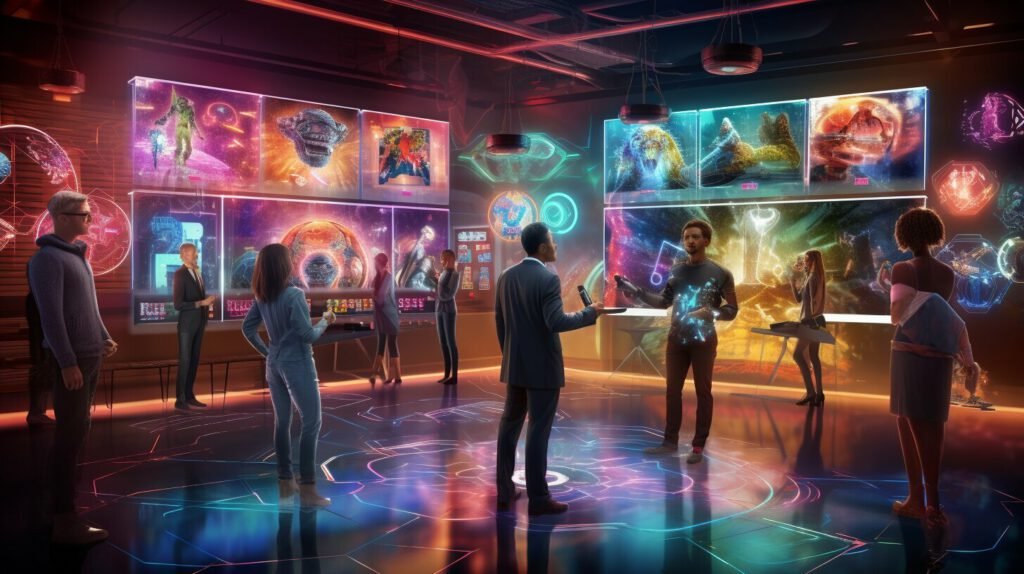Welcome to the age of artificial intelligence and the future of marketing! As technology continues to evolve, businesses are starting to change the way they approach marketing strategies. Artificial intelligence (AI) plays a crucial role in this shift, revolutionizing how businesses interact with their customers and making it easier to create targeted campaigns that generate better results.
In this article, we will explore the role of artificial intelligence in marketing and how it is reshaping the industry. From understanding AI’s impact in marketing to the benefits, challenges, and ethical considerations of using AI in marketing, we will break down everything you need to know to stay ahead of the curve. So, let’s dive in and explore the exciting future of AI in marketing!
Understanding Artificial Intelligence in Marketing
Artificial intelligence (AI) has the potential to transform the marketing industry in ways we could have never imagined just a few years ago. This technology is revolutionizing the way businesses create, implement, and measure their marketing strategies.
At its core, AI is the ability of machines to perform tasks that typically require human-like intelligence, such as natural language processing, image recognition, and decision making. In marketing, AI is helping businesses better understand their customers, personalize their messaging, and optimize their campaigns for maximum impact.
AI-Powered Marketing Tools and Applications
There are a variety of AI-powered marketing tools and applications available on the market today, which are helping businesses automate and streamline their marketing processes. Some of the most popular AI tools include:
| Tool Name | Description |
|---|---|
| Chatbots | AI-powered chatbots can engage with website visitors and answer their questions, providing a personalized customer experience. |
| Predictive analytics | AI-powered predictive analytics tools can analyze customer data and help businesses forecast future trends and behaviors. |
| Content creation | AI-powered content creation tools can generate written content, such as news articles or blog posts, based on user-defined parameters. |
These AI tools are helping businesses make more informed decisions and deliver personalized experiences to their customers. By leveraging the power of AI, marketers can gain insights into customer behavior and preferences, which can inform their marketing strategies.
AI and Data-Driven Decision Making
One of the most significant benefits of AI in marketing is its ability to help businesses make data-driven decisions. By analyzing large amounts of data, AI can identify patterns and insights that would be impossible for humans to spot. This information can then be used to optimize marketing campaigns for maximum impact and ROI.
Overall, it’s clear that AI is becoming an increasingly important tool in the marketing industry. By leveraging the power of AI-powered marketing tools and applications, businesses can gain valuable insights into their customers, make data-driven decisions, and deliver personalized experiences that will set them apart from their competition.
Benefits of Artificial Intelligence in Marketing
Artificial intelligence (AI) is revolutionizing the way businesses approach marketing. By leveraging AI-powered tools and techniques, companies can gain a competitive edge and increase their bottom line. Here are some of the benefits of using AI in marketing:
| Improved Targeting | AI algorithms can analyze vast amounts of data to identify patterns and predict customer behavior. This enables businesses to target the right audience with personalized offers and messages that resonate with them. |
|---|---|
| Personalized Experiences | AI-powered marketing tools can personalize interactions with customers based on their preferences, interests, and behavior. This creates a more engaging and relevant experience for the customer and increases the likelihood of conversion. |
| Cost-Effectiveness | AI can automate routine marketing tasks, such as data analysis and customer segmentation, freeing up time and resources for more strategic initiatives. This can lead to significant cost savings for businesses. |
Overall, AI helps businesses to enhance their marketing efforts by delivering more targeted, personalized, and cost-effective experiences to customers.
Challenges of Implementing Artificial Intelligence in Marketing
While the benefits of artificial intelligence in marketing are significant, there are also several challenges to consider when implementing AI-powered strategies. These challenges include:
| Challenge | Description |
|---|---|
| Data Privacy | The use of customer data for AI-powered marketing can raise privacy concerns. Marketers must ensure that they are collecting and using data in compliance with laws and regulations. |
| Technical Expertise | AI requires specialized technical knowledge, which may be difficult for some businesses to acquire. Companies must either hire qualified individuals or invest in training their existing staff. |
| Cost | Implementing AI-powered marketing strategies can be expensive, especially for small businesses with limited budgets. Companies must weigh the potential benefits against the costs before making a decision. |
| Bias | AI algorithms can perpetuate bias if they are not carefully designed and tested. Marketers must be vigilant in identifying and correcting bias in their AI systems. |
Addressing these challenges requires careful planning and execution. Companies must prioritize transparency, compliance, and fairness in their use of AI technology.
AI-Powered Customer Insights and Analytics
One of the biggest advantages of using artificial intelligence in marketing is the ability to gain valuable customer insights. AI-powered analytics tools can analyze vast amounts of data and identify patterns and trends to help businesses make data-driven decisions.
For example, AI can help businesses identify which marketing channels are most effective for reaching their target audience. By analyzing customer behavior and preferences, AI-powered tools can help businesses tailor their marketing messages and campaigns to better resonate with their audience.
AI can also help businesses predict customer behavior and anticipate their needs. By analyzing data such as browsing history and purchase patterns, AI-powered tools can help businesses recommend products and services that are likely to be of interest to individual customers.
| Benefits of AI-Powered Customer Insights and Analytics: | Examples: |
|---|---|
| Improved targeting | AI-powered tools can help businesses identify their target audience and tailor their marketing messages accordingly. |
| Personalized experiences | By analyzing customer data, AI-powered tools can help businesses deliver personalized marketing experiences, such as product recommendations and targeted ads. |
| Cost-effectiveness | By automating data analysis and insights, AI can help businesses save time and money on marketing research and analysis. |
Overall, AI-powered customer insights and analytics can help businesses better understand their audience and make more informed decisions about their marketing strategies.
AI-Powered Personalization in Marketing
In today’s competitive market, businesses are looking for new ways to connect with their audience and stand out from the crowd. One solution to this challenge is the use of artificial intelligence (AI) to deliver personalized marketing experiences. AI-powered personalization allows businesses to tailor their marketing efforts based on the needs and preferences of individual customers, creating a more engaging and impactful experience.
AI-powered personalization can take many forms, such as targeted ads, personalized product recommendations, and customized email campaigns. By analyzing customer data such as browsing history, purchase behavior, and demographic information, AI algorithms can determine the most relevant and appealing content for each individual.
Examples of AI-Powered Personalization in Marketing
One example of AI-powered personalization is the Netflix recommendation system. By analyzing viewer data, including past viewing history and preferences, Netflix is able to suggest new content that is likely to interest each individual user. This personalized approach has been credited with driving customer engagement and retention.
Another example is the Amazon recommendation engine. By analyzing customer purchase history, browsing behavior, and product reviews, Amazon is able to recommend products that are highly relevant and personalized to each individual. This has been shown to increase customer satisfaction and drive sales.
The Benefits of AI-Powered Personalization
The benefits of using AI-powered personalization in marketing are numerous. By delivering more relevant and engaging content, businesses can improve customer satisfaction and increase brand loyalty. Personalized marketing is also more effective at driving conversions and sales, as customers are more likely to engage with content that is tailored to their needs and interests.
AI-powered personalization also allows businesses to automate many aspects of their marketing efforts, reducing the need for manual intervention and saving time and resources. This can lead to significant cost savings and improved efficiency.
Challenges to AI-Powered Personalization in Marketing
While there are many benefits to AI-powered personalization, there are also several challenges that businesses must overcome to succeed in this space. One such challenge is the need for high-quality data. To effectively personalize marketing content, businesses must collect and analyze accurate and comprehensive customer data. This can be a daunting task, particularly for small businesses with limited resources.
Data privacy is also a key concern in AI-powered personalization. Customers may be hesitant to share personal data with businesses if they don’t trust that the data will be used responsibly. To overcome this challenge, businesses must ensure that they are transparent about their data collection practices and take steps to protect customer privacy.
Conclusion
AI-powered personalization is a powerful tool that can help businesses connect with their audience in a more meaningful and impactful way. By delivering personalized content and experiences, businesses can improve customer satisfaction, build brand loyalty, and drive sales. While there are challenges to overcome, the benefits of AI-powered personalization make it an increasingly essential part of any successful marketing strategy.
AI-Driven Content Creation and Curation
In the age of information overload, businesses are facing the challenge of producing and curating high-quality content that resonates with their target audience. Fortunately, artificial intelligence is revolutionizing the way content is created and curated.
AI-Driven Content Creation
With AI-powered content creation tools, businesses can automate the process of generating text-based content. These tools use natural language generation (NLG) algorithms to produce high-quality content in a fraction of the time it would take a human writer. From news articles to product descriptions, NLG tools can create content that is both informative and engaging.
One example of a successful implementation of AI-driven content creation is The Washington Post’s Heliograf tool. Heliograf uses NLG to produce automated news articles, which are then edited by human writers for style and accuracy. This has enabled The Washington Post to increase its content output and provide real-time updates on breaking news stories.
However, it’s important to note that while AI-driven content creation tools can save time and improve efficiency, they should not completely replace human writers. Content that requires a human touch, such as opinion pieces and creative writing, should still be written by humans.
AI-Driven Content Curation
AI-powered content curation tools can help businesses discover and share relevant content with their audience. These tools use machine learning algorithms to analyze large amounts of data and identify the most relevant and valuable content for a specific audience.
For example, Netflix uses AI-powered content curation to recommend movies and TV shows to its users. The recommendation algorithm analyzes a user’s viewing history and provides personalized recommendations based on their preferences.
Another example is Hootsuite’s Insights feature, which uses AI to analyze social media conversations and identify trending topics and popular content. This enables businesses to stay up-to-date on industry trends and provide content that resonates with their audience.
Overall, AI-driven content creation and curation tools can help businesses streamline their content production process and improve the quality of their content. However, it’s important to use these tools alongside human expertise to ensure that the content produced is high-quality, relevant, and resonates with the target audience.
The Future of AI in Marketing
As technology continues to evolve at a rapid pace, artificial intelligence is expected to play an increasingly important role in the marketing industry. Here are some of the trends and advancements we can expect to see in the coming years:
The Rise of Chatbots
Chatbots are computer programs that simulate conversation with human users. They can answer questions, provide recommendations, and even complete transactions. As AI technology improves, chatbots are becoming more sophisticated and able to handle more complex tasks. In the future, businesses may rely on chatbots to provide personalized customer service, freeing up human agents to handle more complex issues.
The Emergence of Voice Assistants
As more consumers rely on voice assistants like Amazon’s Alexa and Apple’s Siri, businesses will need to optimize their marketing strategies for voice search. This means developing content that’s optimized for long-tail keywords and natural language queries. Businesses may also need to create skills and actions for these platforms to stay relevant and engage with customers.
Hyper-Personalization
As AI algorithms become more sophisticated, businesses will be able to deliver truly personalized experiences to each individual customer. From product recommendations to targeted ads, hyper-personalization will allow businesses to engage with customers in a more meaningful way and drive conversions.
Of course, as with any emerging technology, there are also potential risks and challenges to consider when it comes to AI in marketing. In the next section, we’ll explore some of the ethical considerations businesses will need to keep in mind when implementing AI-driven marketing strategies.
Ethical Considerations of AI in Marketing
As artificial intelligence continues to play a vital role in the marketing industry, it is essential to consider the ethical considerations that come with its implementation.
What are the main ethical concerns related to AI in marketing?
| Privacy | Bias | Transparency |
|---|---|---|
| AI-powered marketing tools collect vast amounts of data, raising concerns about how this data is used and shared, and who has access to it. | AI algorithms and data sets can perpetuate and even amplify biases, such as discrimination against certain groups or stereotypes. | As AI is becoming more prevalent in marketing, it is important to ensure that businesses are transparent about their use of AI and how it affects their customers. |
These concerns highlight the need for proper regulation and monitoring of AI in marketing and for businesses to use AI ethically.
How can businesses ensure ethical AI use in marketing?
- Conduct thorough testing and analysis to identify and mitigate potential biases in AI algorithms and data sets.
- Be transparent about the use of AI in marketing and how it affects customers.
- Obtain explicit consent from customers for the collection and use of their data.
- Implement strong security measures to protect customer data from misuse and hacking.
By incorporating these measures into their AI strategies, businesses can ensure that they are using AI ethically to improve their marketing efforts while respecting the privacy and rights of their customers.
Integrating AI with Traditional Marketing Strategies
Businesses that successfully integrate artificial intelligence with traditional marketing strategies can benefit from improved efficiency and effectiveness in their campaigns. Here are some ways to achieve optimal results:
| Strategy | Description |
|---|---|
| Data-driven decision-making | Use AI-powered analytics to gain insights and inform marketing decisions. |
| Personalization | Use AI to deliver tailored marketing experiences that resonate with the target audience. |
| Automation | Use AI-powered tools for repetitive tasks, such as email marketing, lead scoring, and social media management. |
By integrating AI with traditional marketing strategies, businesses can save time and money, while also reaching their target audience with more relevant and engaging content.
Case Studies: Successful AI Implementation in Marketing
Artificial intelligence is transforming the way businesses approach marketing, driving higher engagement, increasing sales, and enhancing customer satisfaction. Here are some real-world examples of companies that have successfully integrated AI into their marketing strategies:
Netflix: Personalizing Content Recommendations
“Artificial intelligence allows us to continually improve the matching of a member with their next favorite title.” – Netflix
| Challenge | Solution | Outcome |
|---|---|---|
| Provide personalized content recommendations to users | AI algorithm that analyzes user preferences, viewing history, and search queries to suggest relevant movies and TV shows | 35% of Netflix’s viewer activity now comes from content recommendations, increasing user engagement and retention |
Netflix uses machine learning algorithms to analyze user behavior and recommend content that is tailored to their preferences. This has led to a 35% increase in user engagement and retention, as well as saving the company $1 billion in annual revenue by reducing customer churn.
Sephora: Interactive Beauty Assistant
“Visual search and augmented reality are transforming the beauty experience and we are thrilled to incorporate these technologies into our new Sephora Virtual Artist platform.” – Calvin McDonald, President and CEO, Sephora Americas
| Challenge | Solution | Outcome |
|---|---|---|
| Enhance in-store customer experience and increase sales | AI-powered Sephora Virtual Artist tool that uses augmented reality and image recognition to recommend products and show how they would look on the user | 20% increase in conversions for customers who use the tool, as well as higher customer satisfaction and loyalty |
Sephora’s Virtual Artist tool allows customers to try on makeup virtually, receive personalized product recommendations and watch tutorials, both online and in-store. The tool has led to a 20% increase in sales conversions and higher customer satisfaction and loyalty.
Starbucks: Voice-Powered Ordering and Payment
“Now, with Starbucks, you can place your order via messaging, in-app or by voice, and it all goes through the same cloud-based system.” – Mattthew Ryan, Global Chief Strategy Officer, Starbucks
| Challenge | Solution | Outcome |
|---|---|---|
| Reduce waiting times for customers and increase efficiency for employees | Voice-activated AI-powered ordering system integrated with the Starbucks mobile app and artificial intelligence-enabled inventory management system | 30% of all Starbucks orders now come from mobile, with voice orders becoming more popular, leading to higher transaction values and increased customer satisfaction |
Starbucks uses an AI-powered ordering system that integrates with its mobile app and inventory management system, allowing customers to place orders using their voice, significantly reducing waiting times and creating a more seamless customer experience. The system has resulted in a 30% increase in mobile orders, higher transaction values, and increased customer satisfaction.
FAQ about Artificial Intelligence and Marketing
Q: What is artificial intelligence?
A: Artificial intelligence (AI) refers to the ability of machines to perform tasks that typically require human intelligence, such as visual perception, speech recognition, decision-making, and language translation.
Q: How is AI changing the marketing landscape?
A: AI is transforming the way businesses approach marketing by enabling them to gain valuable customer insights, deliver personalized experiences, and make data-driven decisions for more effective campaigns. It is also improving targeting, reducing costs, and creating efficiencies in marketing processes.
Q: What are some benefits of using AI in marketing?
A: AI can provide businesses with improved targeting, increased efficiency, personalized experiences, cost-effectiveness, and valuable customer insights. It can also automate routine tasks, freeing up valuable resources for more strategic initiatives.
Q: What are some challenges of implementing AI in marketing?
A: Some challenges of adopting AI in marketing include data privacy concerns, technical expertise requirements, and potential bias in algorithms. Additionally, integrating AI with traditional marketing approaches can be complex, and some businesses may struggle to justify the costs of implementing AI.
Q: How can businesses integrate AI with traditional marketing strategies?
A: To successfully integrate AI with traditional marketing approaches, businesses should start by identifying areas where AI can add value, such as customer insights or content creation. They should then develop a clear strategy and plan for implementation, ensuring that data privacy, transparency, and ethical considerations are addressed. Finally, businesses should continuously evaluate and optimize their AI-powered marketing initiatives to ensure they are achieving the desired results.
Q: What are some ethical considerations of using AI in marketing?
A: Ethical considerations related to AI in marketing include privacy concerns, potential for bias in algorithms, transparency issues, and the responsibility of businesses to communicate their use of AI to consumers. It is important for businesses to be transparent and accountable in their use of AI and to prioritize the privacy rights of their customers.
Q: What are some future trends and advancements of AI in marketing?
A: Some future trends and advancements of AI in marketing may include the increased use of chatbots and voice assistants, hyper-personalization, and the development of even more sophisticated algorithms for customer insights and targeting. As AI continues to evolve and become more advanced, businesses will need to keep pace with these changes to stay competitive.
Q: Can AI replace human marketers?
A: While AI can automate routine tasks and provide valuable insights, it cannot replace the creativity, strategic thinking, and emotional intelligence of human marketers. AI should be viewed as a tool to augment and enhance human capabilities, rather than a replacement for them.
Q: What are some successful examples of companies that have incorporated AI into their marketing strategies?
A: Many companies have successfully implemented AI into their marketing strategies, including Nestle, which used AI to analyze consumer trends and identify new product opportunities, and Sephora, which uses AI-powered chatbots to provide personalized beauty recommendations to customers. Other successful examples include Netflix’s content recommendation system and Amazon’s voice assistant, Alexa.
Q: Is AI the future of marketing?
A: AI is already transforming the marketing landscape and is likely to become even more pervasive in the years to come. However, it is important to recognize that AI is not a silver bullet and that businesses will still need to rely on human creativity, empathy, and strategic thinking to achieve marketing success.




